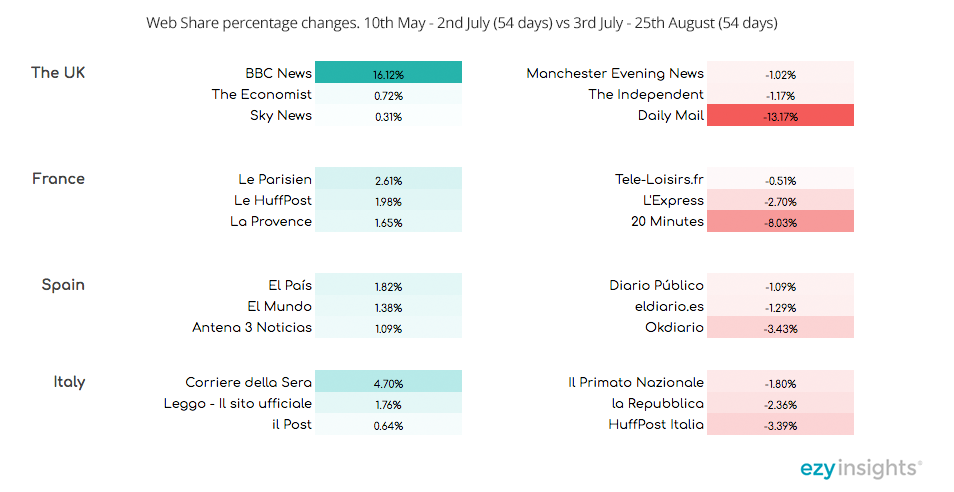At the start of 2018, Facebook announced it would start favouring publishers in the News Feed that they considered “more trustworthy”. A quiet update on the 2nd of July expanded this system to include the UK, Germany, France, Italy, Spain and India.
Facebook’s ‘Trust Index’ is based on user surveys, given out to “people with a wide range of reading habits” according to Facebook’s Adam Mosseri.
We analysed data from before and after the July 2nd switchover. We looked at both the countries mentioned by Facebook and others that should not be affected, to see if any differences were noticeable from the data.
Initial Findings:

- Public Broadcasters have benefited most
- Traditional publishers tended to improve
- UK and France were most affected*
- Little change was observed with Post Engagement (likes, comments, shares)
- Significant change was observed with Web Shares (shares directly from website)
*Both the UK and France rank quite low in terms of overall trust in news across Europe (20th/37 and 29th/37 respectively) and very low for trust in news on social media (12% and 19%).
Biggest rise in Web Share Engagement:
BBC News (UK) 16.12%
Corriere Della Sera (Italy) 4.7%
Le Parisien (France) 2.61%
El Pais (Spain) 1.82%
Biggest fall in Web Share Engagement:
Daily Mail (UK) -13.17%
20 Minutes (France) -8.03%
Huffpost Italia (Italy) -3.39%
In Detail:
Knowing the difference between Post vs Web Share engagement is crucial to understand the changes we have observed for publishers since July 2nd.
Post Engagement refers to likes, comments and shares on a post(s) made by a publisher on their own Facebook page(s).
Web Share engagement refers to the number of times a URL is shared to Facebook from outside of the platform by individual consumers and readers.
News and content that comes via friends and family is both more trusted by users and has been given higher priority in the newsfeed. This type of engagement has been growing over the last years and has largely overtaken Post engagement across Europe in 2018.
Critically, these changes were only revealed when looking at Web Share engagement, a metric that is not tracked in the Facebook-owned tool, Crowdtangle. Web Shares now account for the majority of total Facebook engagement for European news publishers.
Winners and Losers by country
We have complete data for four out of six countries that the July 2nd changes rolled out to.

In contrast, there has not been as much change between publishers across the Nordics. This is expected for three reasons:
- A more stable and less politically polarised media environment
- A higher level of overall trust in news media
- Facebook’s trust changes have not been rolled out in these regions.

In Conclusion
The data we have analysed appears to show that Facebook’s changes to prioritise broadly trusted sources is working as intended. The publishers that have gained the most since the ‘Trust algorithm’ was rolled out are also highly ranked for trust according to the 2018 Reuters Digital News Report. The publishers that have lost the most are all ranked lower in the same report.
Reach, which is a private metric and cannot be measured across publishers, is closely correlated with engagement. It is fair to assume that higher levels of engagement translate to greater reach, while a drop in engagement leads to a loss of reach.
The UK and France have seen the biggest changes to individual publishers, with a particularly dramatic fall for the Daily Mail and a big engagement increase for BBC News. We will continue to monitor these countries to see how the landscape of news publishers on Facebook is further affected.
